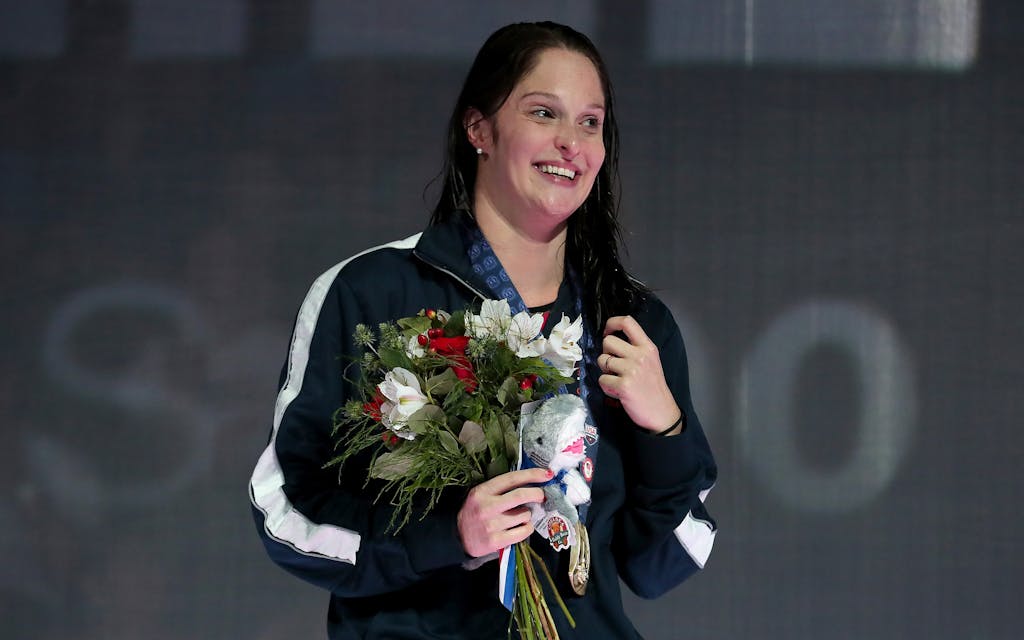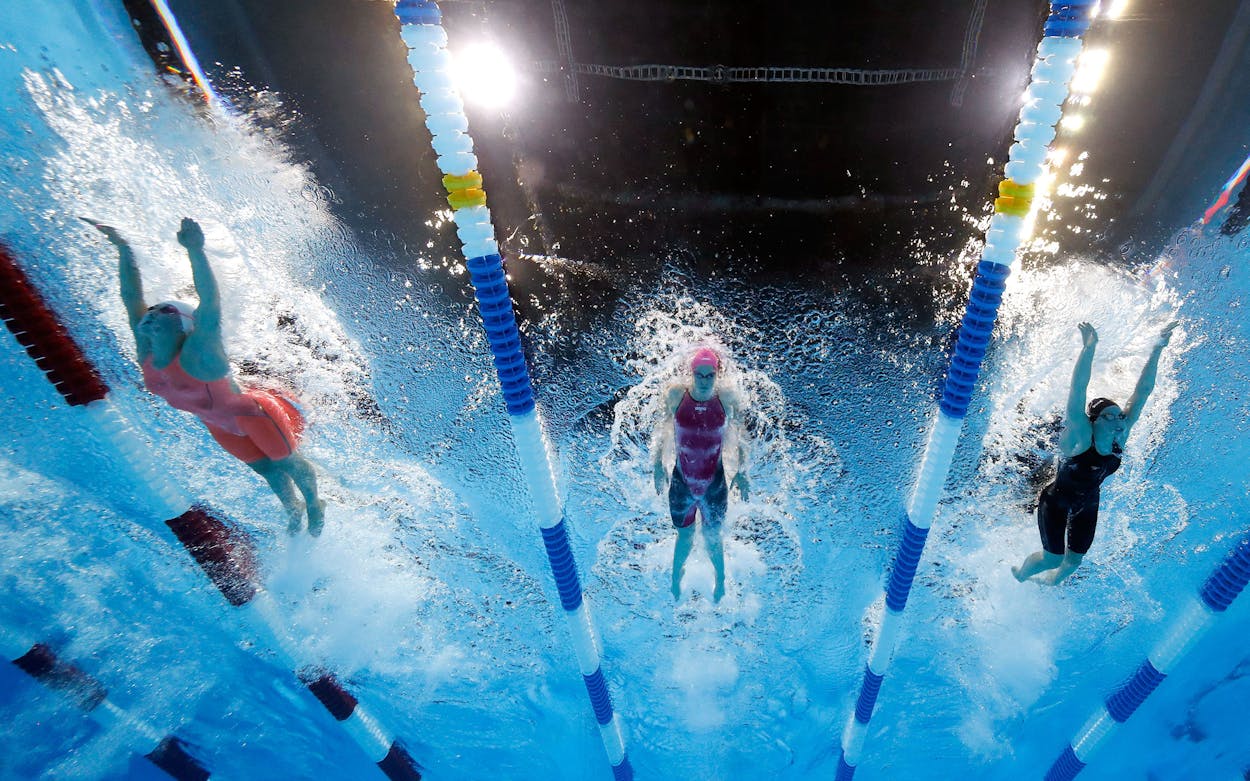The morning after returning home from the 2016 Summer Olympic Games in Rio de Janeiro, two-time Olympic swimmer Cammile Adams was up early and on her way to the Houston suburbs to begin a semester of student teaching, the final requirement she needed to earn her bachelor’s in education from Texas A&M.
Returning to school hours after stepping off a ten-hour flight, and while she was still emotionally drained and physically spent from competition, might sound extreme. It is extreme. But Adams did it because she understood that she was entering a vulnerable time in an athlete’s career. Of the hundreds of Olympians who represent the United States every four years, maybe two or three will return from competition as newly minted stars and household names. The rest, like Adams, exit the world stage in an instant, and the transition from cheers and cameras and VIP treatment to relative anonymity can feel downright stunning.
“Everything revolves around you for about two months, then all of a sudden you’re back in College Station,” Adams told me. “People care who you are and what you did, but not really.”
She knows this better than almost anyone, because four years earlier, after the 2012 London Games, she wasn’t prepared for the emotional letdown athletes call the “Olympic hangover.” She returned to Texas A&M and had trouble grasping that this thing she’d been singularly focused on since around her fourth birthday had come and gone so quickly. Now what?
Adams struggled to find the desire to endure four more years of 6 a.m. practices and grinding through mile after mile in the pool. She finished fifth in the two-hundred-meter butterfly in 2012, and at that point in her life, she wondered what the next chapter would be. She was twenty years old. “My motivation level for life was very low,” she said. “I didn’t want to get out of bed in the morning. All I wanted to do was eat Shipley’s Do-Nuts and sleep.”
At a time when athletes are speaking more frankly than ever about mental health challenges in lives defined by endless pressure, relentless expectations, and careers that end abruptly at an age when most people are just starting their adult lives, Cammile Adams has a different kind of story.
Hers is a happy one. She aggressively confronted her demons in 2012 and arrived at the 2016 Games with a game plan for coping with her second Olympic hangover. Today, at 29, she she lives in the Houston suburbs with her husband, Rad Brannan, and works for a string of swimming schools as a way to contribute to her sport in a completely different way than she did during her physical prime. Now, her lifelong practice of pouring her all into every pursuit has been channeled into a satisfying post-competitive career.
But Adams is also a cautionary tale. “At that level of sports, you’re conditioned to continually want the next thing and aim for the next goal,” she said. “I think that’s healthy. I think that’s good. At the same time, it could be really harmful. I couldn’t picture myself going back and doing all this again.”
She’d been a swimming star—and the center of attention—for almost her entire life. Her dad, Eddie, is a career coach, and her twin sister, Ashley, was both her training partner and best friend. When Ashley retired from swimming after the sisters’ sophomore season at A&M, Cammile got a glimpse of a world outside the pool. And in College Station, those regular kids sure seemed to be having fun.

During Adams’s post-2012 mental fog, her coach on the Aggies swim team, Steve Bultman, became concerned. He, along with nearly everyone else close to her, had always known Adams as the happy, outgoing, never-met-a-stranger type, and that made her newfound lethargy seem all the more alarming. “He knew I was struggling,” she said. “You’re not yourself at practice. You’re not showing up. You’d text him and say, `I’m not feeling well.’ I’ve always been outgoing.”
Bultman was alarmed enough to urge her to seek counseling, and Adams took his advice to heart.
“Steve is amazing,” she said. “I learned a lot about becoming the athlete and the person I wanted to become. He’s just one of the best people I’ve ever met. I tell the parents of girls that have committed to A&M that he’s going to help their daughter swim fast, but he’s also going to help her become the kind of woman you want her to become.”
Thus began Adams’s comeback. She took therapy seriously, opened up in ways she never had, and talked through everything she was thinking and feeling. In the end, she realized that she had to care just a little less about swimming—at least for a while. She got involved in campus activities away from the pool, met her future husband, Brannan, and fell in love with the full Texas A&M student experience.
And then, as she restored balance to her life, something funny happened. Adams got back in the water and started swimming faster than she’d ever swum in her life. Her passion for the sport burned hotter than ever. She won the 2013 NCAA Championship in the two-hundred-meter butterfly, and then moved to Charlotte and toured the world as a member of a professional swim team. “To get through it and get back to swimming, I had to set small goals,” she said. “Some days that was getting up and going to morning practice. Some days that might have been sleeping in but not getting doughnuts. Every day looked a little different.
“One of the biggest things I’ve seen is anytime we go through life changes, you have to really set small goals. If you only set the big ones, you’re going to fail every single time, and you’re never going to get to where you need to go.”
In Rio, her swimming career ended with the fastest race of her life and a fourth-place finish in the two-hundred fly. Yet despite recording a personal-best time of 2:05.90, the thought that she missed the medal stand—Japan’s Natsumi Hoshi took bronze with a time of 2:05.20—by seven-tenths of a second still gnaws at Adams. “I got on that plane thinking I was the only one on the team that hadn’t gotten a medal,” she said.
But at 24, she was excited that she still had more to give the sport. Moments after climbing out of the pool after that final race, she whispered to her dad: “I don’t want to be done.”
“Then don’t be done,” Eddie Adams told her.
She wouldn’t, but life away from swimming was getting more demanding than ever. Adams was planning her wedding that fall and completing her student-teaching requirements. She and Brannan discussed the possibility of her training through one more Olympic cycle, with an eye toward competing in this summer’s Tokyo Games. If she decided to go for it, the couple would most likely have been forced to live apart, as Brannan was beginning his career in the energy sector and needed to stay in Texas, while Adams would have to find a team, most likely outside the state, to stay active in the sport.
But as she took care of wedding details, got a feel for teaching, and got her first glimpse of life away from twice- and thrice-daily practices, Adams sensed something changing within her. Gradually, she realized she could have a full life without competitive swimming. “With so many athletes, and especially swimmers, we don’t finish our career where we want it to end,” she said. “Fourth place is not where I would have ever dreamt of ending my career.
“Yes, I made a second Olympic team. But you feel like when you’re there, every single person comes home with a medal except for you. And it’s hard. It’s super hard. So I ended up fourth, and that day my best just wasn’t good enough. And I had to be okay with that.”
When Adams was presented with the opportunity to own a swim-school franchise with the national chain SafeSplash, she saw it as a way to help kids get into the sport she loves and also use her teaching skills. She now owns six SafeSplash franchises around Houston, and five years removed from Rio, she hasn’t looked back. At some point, she may even get around to displaying her Olympic memorabilia in her home.
“I’m happier than I’ve ever been,” she said. “And looking back now, I was lucky to have people around me that spoke so much wisdom. I just watched the [swimming] trials and saw some of my friends not make the team. Since last week watching the trials, I definitely saw PTSD. I woke up on Monday drenched in sweat. I know what they’re dealing with.”
Now she’s in a comfortable place, satisfied that she gave her sport all she had to give. I asked if she wants her children to pursue competitive swimming.
“I always said I wanted to leave the sport where if my kids wanted to do it, I wouldn’t tell them no,” she said. “This is all Ashley and I ever did. I would love to have my kids play other sports and get to experience other things. But if they end up in swimming, we’ll do it. I want them to love it. I want them to understand how it taught me a lot about the type of person I want to be.”






